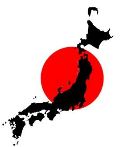 Econintersect: Industrial production in Japan fell in February by 2.3% from January. Economists had been expecting an increase of 0.3%. Severe winter weather may have been a major factor. The weather seems even more likely the culprit when the just-released Tankan business sentiment survey is considered.  The Bank of Japan survey for March found manufacturing sentiment at levels last seen in 2007.  Non-manufacturing sentiment reached a 22-year high.
Econintersect: Industrial production in Japan fell in February by 2.3% from January. Economists had been expecting an increase of 0.3%. Severe winter weather may have been a major factor. The weather seems even more likely the culprit when the just-released Tankan business sentiment survey is considered.  The Bank of Japan survey for March found manufacturing sentiment at levels last seen in 2007.  Non-manufacturing sentiment reached a 22-year high.
The graphs below show the recent rapid rise in business sentiment. They also show a very sharp drop expected in April. The reason for the pessimistic projection is an increase in Japan’s “consumption tax” which rises from 5% to 8% today (01 April).
Vertical line rhs of each graph defines current data. Right of those are projections.
Japan seems to be attempting something that could produce the ultimate frustration: Pursue a expansive monetary policy and up until now an stimulative fiscal policy only to suddenly raise a broad tax by 60%.  GEI News, in an article titled “Japan: Conflicted Policy“, wrote last summer:
Japan introduced a consumption tax (CT), the equivalent of the European Value Added Tax (VAT), in 1989. Initially the tax was 3%. In 1998 the tax was increased by 67% to 5% where it remains currently. The two tax dates coincide with the start of serious economic disruption in Japan: (1) 1989 was the peak of the Japanese expansionary bubble and (2) 1998 was the start of Japan’s most serious post-peak recession until The Great Recession of 2007-2009.
The CT changes may not have “caused” the two contractions, but it would be hard to argue that they did not exacerbate them.
Now the government is planning to introduce a negative consumption shock even greater than the first two over an 18-month time span, up from 5% to 8% CT in less than a year (April 2014) and another hike to 10% in October 2015.

